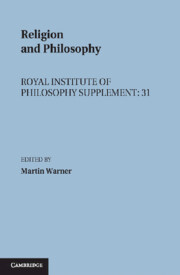The Logic of Mysticism
Published online by Cambridge University Press: 04 August 2010
Summary
This title represents, I suppose, a kind of challenge; for there seems at first sight some incompatibility between the practice of logic and mysticism, a contrast between the rational and the intuitive, the tough minded and the tender-minded. In taking up this challenge, I propose to argue with the help of two thinkers commonly admired for their attention to logic and its rights. I shall refer for the most part to St Thomas Aquinas but with occasional reference to Wittgenstein. Whatever may be said of the latter, it seems to me quite clear that St Thomas was a mystical thinker in that he was centrally concerned with the unknown and, in one sense, ineffable mystery of God and that he devoted a great deal of thought and writing to the problems associated with speaking of what is, in this sense, ineffable. I want to argue that in what is sometimes misunderstood as his dryly rational approach, even in his arguments for the existence of God, he is in fact engaged in, and inviting the reader to be engaged in, a mystical exploration, which is not at all the same thing as a mystical experience. Here the key notion is that of what he refers to as esse.
Perhaps I should say right away that for St Thomas we come to see the need for the particular use he has for the word esse (which is, after all, only the Latin infinitive of the verb to be) as the result of an argument not as the result of an experience—not even the experience of being convinced by an argument.
- Type
- Chapter
- Information
- Religion and Philosophy , pp. 45 - 70Publisher: Cambridge University PressPrint publication year: 1992



